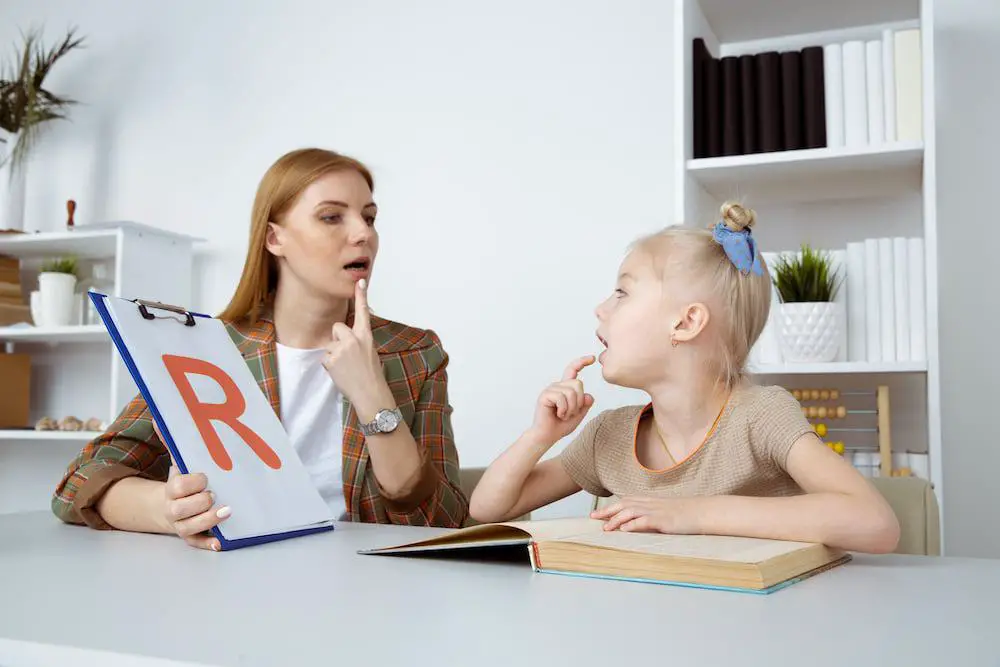One of the key areas speech therapists work on to improve both verbal and non-verbal communication is speech.
Speech is an aspect that deals with articulation, stutters, and voice disorders—elements that directly impact the way you speak.
Today, we’ll look at how articulation for speech therapy works.
We’ll tackle its importance, the building blocks necessary to develop it, the problems that can occur with poor articulation, and how to improve articulation.
What Is Articulation in Speech Therapy?
Articulation in speech therapy or articulation therapy focuses on pronunciation and talking.
It deals with a person’s ability to move the lips, tongue, teeth, and jaw to produce speech sounds.
Also called traditional articulation therapy, it supports and improves the formation of words and sounds.
It also determines how well you can be understood by those on the receiving end of your verbal information.
Why Is Articulation Important in Speech?
Articulation determines how well sounds, words, and sentences are produced and how clearly they can be interpreted by others.
Good articulation helps one engage in reciprocal conversations with ease and fluency.
Depending on the severity, speech difficulties can impact how well children interact with adults and their peers.
It affects how their language and social skills develop.
A child who cannot be understood easily can get angry and frustrated about their situation.
That, in turn, could lead to behavioral issues.
Literacy skills, such as reading and spelling, are also influenced by articulation.
Articulation for speech therapy works to address all these issues and more to improve a child’s verbal and non-verbal communication skills.
How to Develop Good Articulation
It doesn’t matter if your child meets their speech milestones on time or if they’re operating on their own timeline and are a bit late to the program.
What’s important is that they develop in the following aspects to have good articulation:
Hearing
Having good hearing helps a child better detect speech sounds and model his or her sounds after them.
Of course, this would require the child’s everyday models to be good at articulating words and phrases.
Middle Ear Functioning
In most cases, problems with the middle ear are what affect speech.
Whether it’s ear infections, ear wax, or colds that block the ears, they usually have a way of interfering with a child’s hearing.
This, in turn, impacts the way words and sounds are articulated.
You can count on traditional articulation therapy to deal with these problems with efficacy.
Muscle Coordination
Muscle coordination is a huge factor in determining the quality of sounds that comes out of a person’s mouth.
The way the muscles in your diaphragm, tongue, vocal cords, palate, and jaw move and coordinate contribute to your articulation.
If you’re healthy in all these areas, that can go a long way to helping you produce great sounds.
Speech Sound Processing
This deals with how a child identifies even the slightest differences in sounds.
When mispronounced even the slightest, vowels can completely change what a word sounds like to a listener.
A speaker who processes speech well can understand sounds better and, in turn, create them correctly.
Understanding
Good articulation has a lot to do with how one understands sound.
When you know the meaning a specific sound conveys, you can stay true to that meaning when you create it.
Attention and Focus
Articulation may be easy when you get the hang of it, but it does take work to get it to a good place.
To become excellent in articulation, you need to be able to listen to and produce speech at a sustained level without getting affected by distractions.
It doesn’t necessarily need to be too long, either, but just enough to get the task of communicating done effectively.
Articulation speech therapy can help a child achieve just the right balance between these elements.
Signs of Articulation Problems
A child who finds it challenging to articulate usually shows the following signs:
- Frustration due to the inability to get the point across
- Produce sounds and words that are difficult to place even for friends and family
- Finds difficulty in combining two or more sounds
- Mostly uses vowel sounds, which are open-mouthed and easier to produce
- Produces messy speech while eating messily
- Produces speech that’s significantly less clear than his or her peers
- Has a lisp that causes mispronunciation of sibilants, like s and z, as a toddler or preschooler
- Finds it difficult to produce several sounds even by kindergarten

More Serious Problems Related to Articulation
Articulation difficulties can also lead to problems in the following areas:
Socializing
A child who doesn’t articulate clearly can have difficulty engaging in mutual interactions with other kids and adults.
They will find it hard to compromise with their peers and not be able to identify or follow norms.
Self-esteem
Poor articulation can be tough for kids.
With the teasing also comes the loss of confidence in themselves and their speaking skills.
This can result in a child staying mostly quiet and keeping to themselves.
They may no longer hold any kind of belief that they can accomplish a task.
Independence
The only way a child will feel safe is when he or she is at home or with a parent.
This is probably because of all the teasing in school due to his or her speech impediment.
Make sure you get in touch with the school or the teacher if you suspect this could be happening.
Behavior
It can be incredibly frustrating for a child to not be understood when he or she wants to communicate so badly.
This happening constantly can manifest in your child’s behavioral changes.
You might find your little one becoming overly frustrated about his or her situation.
Reading and Spelling
Here’s another area that will take the brunt of poor articulation.
The sounds that come out of the child’s mouth will be difficult to understand and could lead to some embarrassing moments at school.
This is one more reason to have articulation speech therapy implemented urgently.
Using Expressive Language
When articulation is less than ideal, it can limit how a child is able to express themselves.
Expressive language relies on various forms of communicating wants, ideas, thoughts, and needs.
A child whose articulation isn’t quite at a high level may resort to shortening sentences or phrases to be understood better.
Fluency
This deals with the flow of words, sounds, and syllables.
With poor articulation, you can hardly expect a child to achieve the peak of fluency in terms of verbal communication.
How Can I Help My Child With Speech Articulation Problems?
Pronunciation and talking problems in speech can be addressed using the following solutions:
Showing
If you have no idea what your little one is talking about, ask him or her to show you what it is instead.
You can also ask your child to repeat the word or sentence and try to guess what he or she means.
You shouldn’t be afraid to tell your child that you don’t understand.
Reading
Reading to your youngster can help overcome articulation problems.
Listening and Responding
Don’t pay too much attention to pronunciation errors.
Instead, try to understand your child’s message and respond to it.
Talking
Talking often to your little one helps them have a daily model for proper word pronunciation.
Playing
This serves as another opportunity for parents to model and use a variety of different sounds to help kids pronounce correctly.
Reducing Background Noise
Background noise can impede articulation development in some kids.
As such, when engaging with your youngster, make sure distractions are minimal, or there are none at all.
Looking
Maintain eye contact with your child when speaking to them.
Encourage them to not look away from you so that they can copy how sounds are created and how words are pronounced correctly.
Repetition
Words and sentences that are unclear bear repeating.
Answer an unclear question by repeating it back to your child.
Doing so helps you become a good language model and shows your child that you were listening to what he or she was saying.
How Do You Fix Articulation in Speech Through Activities?
The following are activities that can help improve pronunciation and talking:
Naming
Naming the things your child sees daily is a great way to remedy articulation problems in speech.
Of course, you must make sure the words and sounds that come out of your mouth are correct.
In this way, your child has a good model for articulation.
Copying
Do facial expressions with your child in the mirror.
Show your little one how the lips, jaw, mouth, and tongue are supposed to be shaped when creating certain sounds.
Modeling
Doing a variety of sounds during play and daily interactions let the child associate a specific sound with an action.
For instance, “shhh” would pertain to sleeping.
Correcting
When a word is uttered incorrectly, make sure to model back the correct pronunciation.
There’s no need to tell your child they were wrong.
Respond through positive correction by shaping your response to model the correct version of the word, phrase, or sentence that was just said.
How Articulation for Speech Therapy Helps
Articulation therapy offers therapeutic intervention for children with talking and pronunciation issues.
It helps improve their ability to produce clear speech and sounds and understand other sounds.
It also aims to help them engage with others verbally and non-verbally, spell and read, as well as deal with speech problems and challenges.

